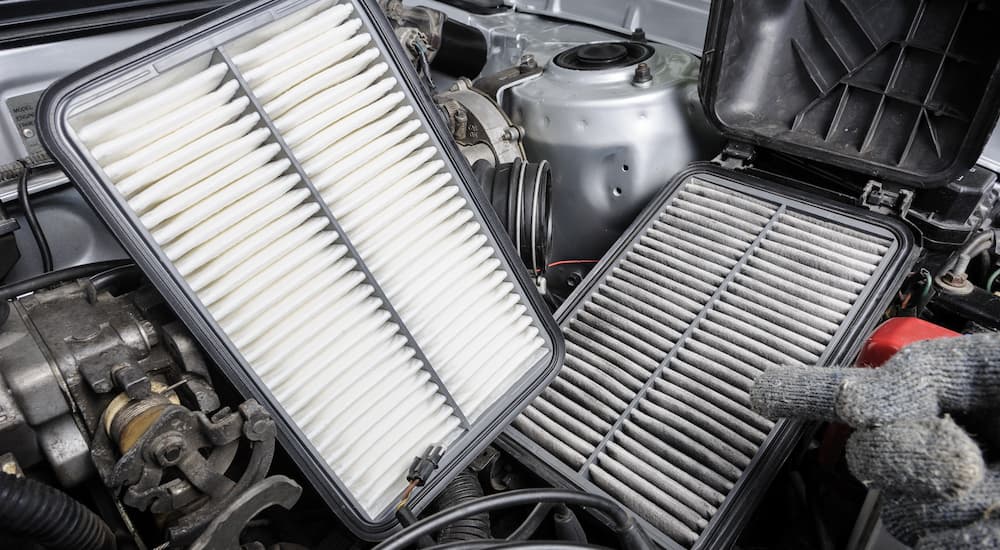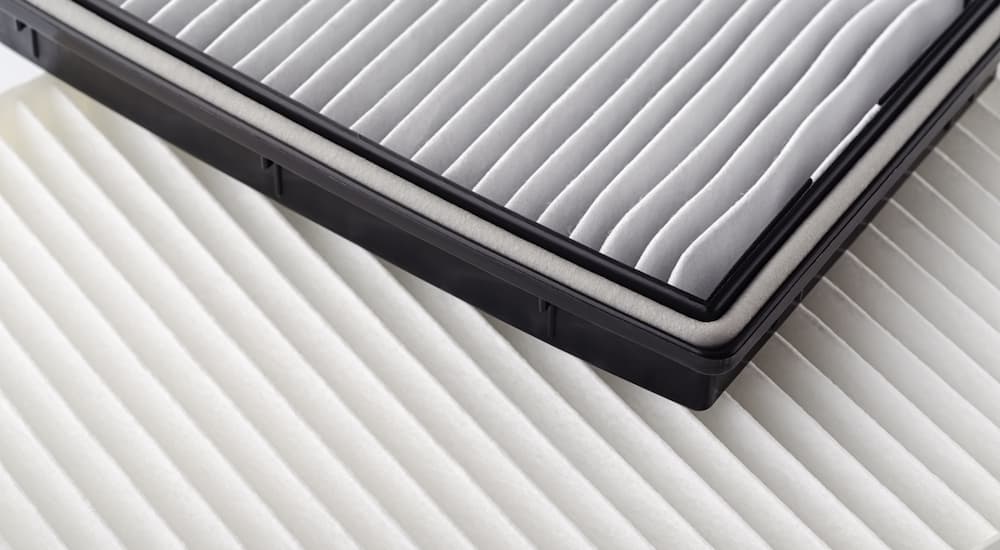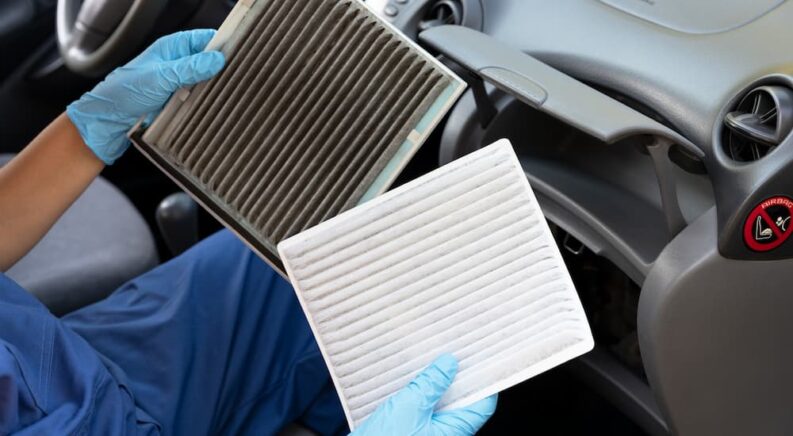There are a number of essential aspects to automotive maintenance, and one that often can be overlooked is your car’s air filters. The integrity of your filters is paramount for several reasons, and you have far more of them than you may realize. Knowing what each one does is critical to the well-being and performance of your car.
Of course, different models might have different filters than others, but there essentially are a few standard filters you can bet are present and need your attention. One is your cabin air filter, which cleans the air circulating through your cabin. If you’re a commuter or urban driver, having a clean cabin filter keeps you from breathing in car fumes and pollution. Timely car air filter replacement helps you maintain a healthy in-automobile environment. If you or someone who often rides in your vehicle suffers from allergies or asthma, having a clean filter can lessen symptoms and make your travels more enjoyable.
A second filter you need to be aware of is the engine filter. This works much like the cabin filter—only, instead of cleaning the air you breathe, it helps keep clean the air that feeds your engine’s pistons with oxygen to aid in its combustion of fuel into power. Thus, this air filter is integral to your engine running as efficiently as possible.
Consulting your owner’s manual will show you how to access your filters and what replacements you’ll need to keep your vehicle running smoothly. Many car owners find it rather easy to access their vehicle’s filters and replace them as needed—but what about when it’s not so easy? What happens when debris gets jammed up in there or when a pest nest develops?
This is not as unlikely as it sounds. Numerous factors can contribute to a shortened lifespan for your air filters, like dust buildup, insect infestation, or rodents making a home where they aren’t wanted. But don’t stress! We’re here to help. Read on to learn about what you can do to replace your air filters and mitigate unwanted guests and unexpected grime.

A Car Filter and a Pest Nest
Whether it’s rodents or insects, these little critters and tiny bugs can become a huge nuisance when they make a home inside your vehicle. This can lead to some not-so-great situations—so when you discover a pest nest, it’s important to remove it right away to maintain the healthy air quality and function of your vehicle.
If your car is acting strange, there are some tell-tale signs that it could be unwelcome guests messing with your car filters. Symptoms of pesty visitors can include sluggish performance, a decline in fuel economy, musty or unpleasant odors coming from the vents, and the glow of the ‘check engine’ light.
While plenty of things can cause issues like this, checking your filter can quickly rule out whether or not an infestation is to blame. If your vehicle is fairly new or well-maintained, chances might be as simple as an issue with a clogged filter. How might a filter get so clogged? Especially if it’s been installed recently?
Rodents have been known to wiggle inside small spaces of vehicles to create warm little homes for themselves, and a soft air filter can make an ideal bed. If a mouse, chipmunk, or other rodent has moved in, you’ll notice it right away when you examine your air filter; oftentimes, there will be overwhelming evidence in the form of paper, hair, fuzz, trash, etc. The little pest might even delight in chewing on your air filter here and there, which would create rips and holes that can let dirty air into your cabin. Should you find a rodent, replacing your filter right away will give you peace of mind, and your air quality will return to being clean.
What if you notice insects like wasps building a home in your filter? Should you worry? Even bugs like bees and wasps have been known to chew up paper and damage filters—so yes, safely replacing the filter is the best move. But if it is wasps, you’ll want to be extra cautious. (Incredibly, immensely, super-duper cautious.)
Assuming a small creature like a mouse or wasp can’t do any damage is a failure of the imagination; they are called pests for a reason. Small steps to take to avoid large issues later on include knowing how your car usually runs, being aware of the last time you had your filter changed, and remembering the signs and symptoms of an infestation.
Debris in Your Cabin Air Vents
Maybe it’s not a problem with pests, but something else gumming up the works and affecting your cabin’s air quality. Maybe it’s leaves, dirt, twigs, or debris that has somehow gotten into and is now ruining your cabin’s air quality—so what are you to do?
Checking your air filter is often made simple since many vehicles are designed to offer easy access for drivers. Locating your cabin air filter and keeping an eye on it is important. When replacing your filter, it’s essential to make sure you get one that fits correctly. If it fits loosely or there is gaping, unwanted debris can fall down into the blower motor, which can cost you even more time and money to clean up.
When debris falls into your blower motor, you’ll often hear a slight ticking noise; this should clue you in that something isn’t going right and that your cabin filtration system needs to be looked at.
Cleaning debris out of a blower motor is more involved than simply changing the filter. It’s usually best to consult a professional if you don’t feel confident addressing the matter yourself. However, perusing your owner’s manual can be helpful if you want to tackle the job yourself. Removing the blower motor, cleaning out the fallen debris, and replacing it can be done in an afternoon and immediately improve the quality of your vehicle’s performance and cabin air.
While particulates like dirt or crumbled leaves might not be a big deal and can be easily removed from the blower motor, larger things—if allowed to remain—can cause damage. When that happens, a new blower motor might have to be installed. Getting the opinion of a qualified mechanic can help clear up the situation if you’re unsure where to go from there.

When Should I Replace My Air Filters?
To avoid the presence of pests and the buildup of debris inside your filters, how often should they be replaced? As with most things, it can depend on your environment and how much use the vehicle sees. Extreme weather, heavy use, or living in a rural environment can all reduce your filters’ lifespan. In that case, having them changed frequently is a must-do to maintain the air quality and performance of your vehicle.
If your vehicle sees light to average use, it’s recommended that you have your filters changed yearly or every 12,000 to 15,000 miles—but this can vary from model to model and be affected by your driving habits. Consulting with your car’s manual will also give you an idea of when your filters should be changed out to maintain optimal performance.
Even if you only change your filters yearly, checking them every few months to make sure they aren’t clogged or damaged is a smart way to ensure your vehicle delivers top performance and fresh air for mile after mile.

